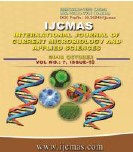


 National Academy of Agricultural Sciences (NAAS)
National Academy of Agricultural Sciences (NAAS)

|
PRINT ISSN : 2319-7692
Online ISSN : 2319-7706 Issues : 12 per year Publisher : Excellent Publishers Email : editorijcmas@gmail.com / submit@ijcmas.com Editor-in-chief: Dr.M.Prakash Index Copernicus ICV 2018: 95.39 NAAS RATING 2020: 5.38 |
Plant growth promoting rhizobacteria (PGPR) are beneficial bacteria that colonize plant roots and enhance plant growth by a wide variety of mechanisms. The isolate of PGPR designated as Pseudomonas aeruginosa strain (2CpS1) was successfully isolated from the soil and rhizosphere of roots of plants growing in fields, Almora district. Subsequently, an experiment was conducted under plant growth chamber where chickpea plants are grown in plastic cups containing soil and mixed with isolates of PGPR and were imposed with 150mM NaCl to investigate the effect of PGPR on the growth of chickpea plant under salinity condition. Isolates of PGPR induced production of plant hormones (Indole acetic acid), phosphate solubilization and ammonia production to enhanced plant growth. The isolate resulted in a significant increase in shoot length, root length, leaf area and dry matter production of shoot and root of chickpea seedlings. Therefore, present study suggests that PGPR isolates (2CpS1) may be used as bio-fertilizers to enhance the growth and productivity of chickpea.
 |
 |
 |
 |
 |